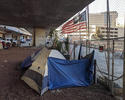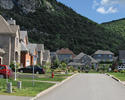Let’s start at the beginning, Joel. In talking about your new book, “The Coming of Neo-Feudalism: A Warning to the Global Middle Class,” do you literally fear that liberal capitalism is losing out to economic “feudalism”? And please put that word feudalism in a modern context for our readers. read more »
Demographics
Joel Kotkin Q&A on 'The Coming of Neo-Feudalism'
- Login to post comments
Social Bonds are Fraying Fast in America's Cities
The evening cheers in support of health care workers during the worst of New York’s coronavirus outbreak were a rare bright spot in a day full of depressing developments. read more »
- Login to post comments
Welcome to Marquette Park
So last month I saw an article in the New York Times about the resurfacing of a video documenting a racist attack on black children in Rosedale, Queens in New York City in 1975. A group of black kids from a nearby neighborhood decided to go on a "bike hike" through surrounding neighborhoods. Little did they know they would stumble on a protest against black movement into the area. read more »
- Login to post comments
Combined Statistical Areas: Ready for the Dispersion Demand
The years to come seem likely to see America’s historic population dispersion continue or accelerate, as pandemic and lockdown worries have severely reduced the attractiveness of dense urban cores (especially in the highest density areas, such as New York City). As a result, the sparsely populated outer areas of combined statistical areas (CSAs), the largest category of local labor market defined by the Office of Management and Budget (OMB), could be the destination of many former urban core households. read more »
- Login to post comments
Networks and Cities in a Post-COVID Era
Not long ago, Tom Delonge, one of the founders of the punk-rock band Blink 182 and founder/front man for the alternative band Angels and Airwaves, decided to put together an interesting public benefit corporation based in California. It just so happens to be a company that conducts research on UFOs. But what’s interesting here is how Delonge’s To The Stars Academy (TTSA) have been able to promote this subject, not just on obscure websites or the Joe Rogan podcast, but through other more surprising channels. read more »
- Login to post comments
Perspective: U. S. COVID-19 Deaths and Urban Population Density
There is wide consensus that the COVID-19 virus spreads person-to-person, especially in confined spaces that are insufficiently ventilated. It is exacerbated by prolonged proximity, which John Brooks, the Centers for Disease Control and Prevention’s chief medical officer indicates is 15 minutes or more of unprotected contact with someone less than 6 feet away. read more »
- Login to post comments
No, College Kids Aren't All Reckless or Selfish
There’s no denying that the new spike in COVID-19 cases we are seeing is driven by “younger Americans.” Some states are re-closing bars and restaurants, or pausing other reopening measures. Dr. Anthony Fauci might have put it best when he told a Senate committee, “Bars: really not good, really not good.” But people are seeing the word “younger” and misreading it as “college kids.” read more »
- Login to post comments
Storied Cities
Athens is the birthplace of Western culture, with the physical ruins of its classical age still visibly present as a perpetual reminder. Virgil composed his epic poem, The Aeneid, recounting the mythic flight of Aeneas from defeated Troy to Italy, becoming the forbear of Rome. New York sees itself as unique center of commerce, founded when the Dutch (not the English) bought Manhattan for beads in the city’s first hustle. Nashville needs no reminder that it’s the center of country music, nor Detroit that it is the Motor City. read more »
- Login to post comments
How the Virus Is Pushing America Toward a Better Future
Pessimism is the mood of the day, with 80 percent of Americans saying the country is generally out of control. Even before civil unrest and pestilence, most Americans believed our country was in decline, Pew reported, with a shrinking middle class, increased indebtedness and growing polarization. read more »
State of the Nation on July 4 and How It Has Changed Over Time
Coronavirus, a shattered economy, racial tensions, deep partisan polarization. Is it any surprise that Americans are down in the dumps? How could it be otherwise? Putting today’s sentiments in historical perspective using polls conducted over many years helps to assess our current malaise. read more »
- Login to post comments






















